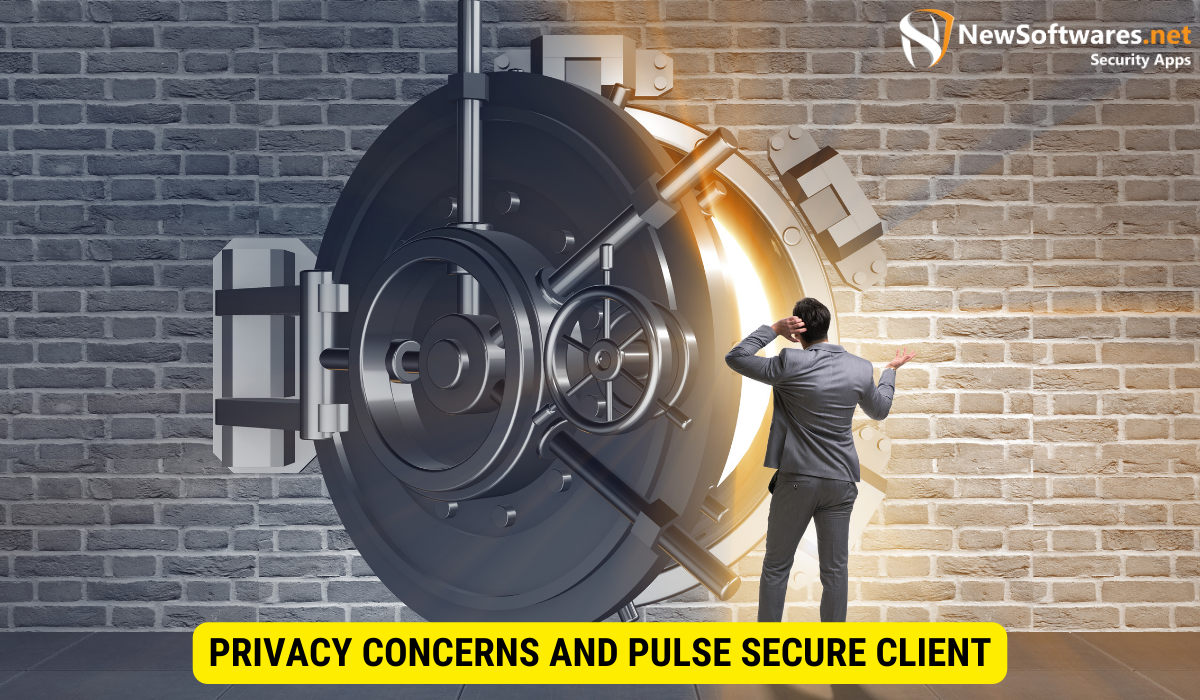Pulse Secure Client is a critical component of data security. It collects user, device, and network data to facilitate secure connections. Data is processed and stored securely, and privacy concerns are addressed through a comprehensive privacy policy. Users can trust Pulse Secure Client to prioritize data security and compliance with privacy regulations.
Pulse Secure Client is a crucial component in ensuring data security. By comprehending the data collected by this client, organizations can better understand the impact it has on their privacy concerns and make informed decisions regarding its usage. I will shed light on various aspects of Pulse Secure Client’s data collection process, including its types, methods, and the processing and storage practices employed. Furthermore, we will address common privacy concerns associated with this client and highlight Pulse Secure Client’s commitment to privacy through its comprehensive privacy policy. Let’s dive deeper into this topic to gain a better understanding of the data collected by Pulse Secure Client.
Introduction to Pulse Secure Client

Pulse Secure Client is a software application that provides secure remote access to corporate networks. It allows users to connect to their organization’s intranet from external networks while ensuring data security. As a vital part of the remote access solution, Pulse Secure Client collects various types of data to facilitate secure and seamless connectivity.
When it comes to remote access solutions, security is of utmost importance. Organizations need to ensure that their employees can securely access corporate resources from any location without compromising sensitive data. This is where Pulse Secure Client comes in. By establishing a virtual private network (VPN) connection, it creates a secure tunnel for data transmission between the user’s device and the corporate network.
What is Pulse Secure Client?
Pulse Secure Client is a software client used to establish virtual private network (VPN) connections. VPNs create a secure tunnel for data transmission between the user’s device and the corporate network. By encrypting data traffic, Pulse Secure Client helps safeguard sensitive information from potential security threats.
But what exactly does it mean to establish a VPN connection? When a user initiates a connection using Pulse Secure Client, their device creates a secure and encrypted connection to the corporate network. This connection ensures that all data transmitted between the user’s device and the corporate network is protected from unauthorized access.
Pulse Secure Client utilizes industry-standard encryption protocols to secure the data traffic. This means that even if someone intercepts the data being transmitted, they won’t be able to decipher it without the encryption keys. This level of security is crucial, especially when accessing sensitive information such as customer data, financial records, or trade secrets.
Importance of Pulse Secure Client in Data Security
Pulse Secure Client plays a crucial role in ensuring data security for organizations. By providing secure remote access to corporate resources, it allows employees to work remotely without compromising data integrity. With the increasing prevalence of remote work, Pulse Secure Client has become even more essential in securing data transmission over external networks.
One of the key benefits of Pulse Secure Client is its ability to authenticate users before granting them access to the corporate network. This ensures that only authorized individuals can connect to the network, reducing the risk of unauthorized access and potential data breaches. Additionally, Pulse Secure Client provides granular access controls, allowing organizations to define specific access policies based on user roles and responsibilities.
Furthermore, Pulse Secure Client offers advanced features such as multi-factor authentication (MFA) and endpoint compliance checks. MFA adds an extra layer of security by requiring users to provide additional verification, such as a fingerprint scan or a one-time password, before gaining access to the network. Endpoint compliance checks ensure that the user’s device meets specific security requirements, such as having up-to-date antivirus software or the latest operating system patches.
Overall, Pulse Secure Client is an essential tool for organizations looking to secure their remote access infrastructure. By providing a secure and encrypted connection, it allows employees to work remotely while ensuring that sensitive data remains protected. With its robust security features and ease of use, Pulse Secure Client is a trusted solution for organizations of all sizes.
Types of Data Collected by Pulse Secure Client
When using Pulse Secure Client, certain types of data are collected to enhance the user’s experience and ensure the security of the connection. The data collected can be categorized into three main types: user information, device information, and network information.
User Information
Pulse Secure Client collects user information, such as login credentials, to authenticate and authorize access to the corporate network. This information is crucial for ensuring that only authorized users can establish a VPN connection. User information is encrypted and securely transmitted to maintain confidentiality.
Device Information
Device information, including the type of device being used, operating system details, and software versions, is collected to ensure compatibility and provide appropriate configurations for secure connection establishment. This information also helps in identifying and preventing potential security vulnerabilities.
Network Information
Pulse Secure Client collects network information to optimize VPN connections and ensure seamless data transmission. This includes details about the network’s quality of service, latency, and available bandwidth. Network information helps Pulse Secure Client make intelligent decisions about automatically selecting the best available network path for data transmission.
How Pulse Secure Client Collects Data
Pulse Secure Client collects data at various stages, including during installation, use, and updates. This section explores the data collection process during each of these stages.
Data Collection During Installation
During the installation process, Pulse Secure Client collects necessary information, such as user preferences and system configurations. This allows the client to tailor the VPN connection according to the user’s requirements and ensure compatibility with their device and network settings.
Data Collection During Use
While in use, Pulse Secure Client collects data related to user activity, such as connection duration and the number of data packets transmitted. This information helps in identifying any anomalies or potential security threats. It also aids in monitoring network performance and optimizing the VPN connection for a seamless user experience.
Data Collection During Updates
Pulse Secure Client collects data during updates to ensure the client remains up to date with the latest security patches and features. This data includes update preferences and system information necessary for delivering the appropriate updates to the client.
Data Processing and Storage by Pulse Secure Client
Once data is collected, Pulse Secure Client employs various data processing and storage practices to ensure security and privacy.
Understanding Data Processing
Pulse Secure Client processes collected data with utmost care and in compliance with relevant privacy regulations. Data is used for purposes such as connection optimization, troubleshooting, and enhancing the overall user experience. Data processing activities are carried out within the boundaries of the client and are not shared with third parties unless explicitly authorized by the user or required by law.
Secure Data Storage Practices
Pulse Secure Client prioritizes the security and integrity of collected data. All data is securely stored using industry-standard encryption techniques to prevent unauthorized access. Additionally, Pulse Secure Client implements strict access controls and follows best practices in data storage to maintain data confidentiality, integrity, and availability.
Privacy Concerns and Pulse Secure Client

Privacy concerns often arise with the collection and processing of data by software applications. In this section, we address some common privacy concerns associated with Pulse Secure Client and how the client addresses them.
Addressing Privacy Concerns
Pulse Secure Client takes privacy concerns seriously and is committed to protecting user data. The client adheres to strict privacy policies that outline how data is collected, processed, and stored. Furthermore, Pulse Secure Client provides users with transparency and control over the information collected, allowing them to manage their privacy preferences and choose what data is shared with the client.
Pulse Secure Client’s Privacy Policy
Pulse Secure Client’s privacy policy provides detailed information about the client’s data collection, usage, and storage practices. The policy outlines the client’s commitment to privacy and the measures taken to protect user data. It is essential for users to review and understand this policy to make informed decisions about using the client.
Key Takeaways
- Pulse Secure Client plays a vital role in ensuring data security during remote access to corporate networks.
- The data collected by Pulse Secure Client includes user information, device information, and network information.
- Data collection occurs during installation, use, and updates, enabling optimized and secure connections.
- Pulse Secure Client processes and stores data securely to protect user privacy.
- The client addresses privacy concerns by providing transparency, control over data sharing, and a comprehensive privacy policy.
FAQs
Can I trust Pulse Secure Client with my sensitive data?
Yes, Pulse Secure Client prioritizes data security and employs industry-standard encryption techniques to protect sensitive data.
Does Pulse Secure Client share my data with third parties?
No, Pulse Secure Client does not share user data with third parties unless explicitly authorized by the user or required by law.
How does Pulse Secure Client optimize VPN connections?
Pulse Secure Client collects network information, such as quality of service and available bandwidth, to make informed decisions about the best network path for data transmission.
What measures does Pulse Secure Client take to comply with privacy regulations?
Pulse Secure Client adheres to relevant privacy regulations and ensures that data processing activities comply with these regulations.
Where can I find Pulse Secure Client’s privacy policy?
Pulse Secure Client’s privacy policy can be found on their official website or by contacting their support team.
Conclusion
In conclusion, understanding the data collected by Pulse Secure Client is crucial for organizations and individuals seeking to balance data security and privacy concerns. This article provided insights into Pulse Secure Client’s data collection process, including the types of data collected, the methods used for collection, and the processing and storage practices implemented. Moreover, we addressed common privacy concerns associated with Pulse Secure Client and emphasized the client’s commitment to privacy through its comprehensive privacy policy. By being informed about the data collected by Pulse Secure Client, users can make informed decisions and mitigate any potential privacy risks.
